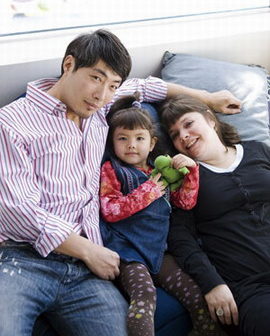Beijing families take on the financial crisis
As economies around the globe have slowed or fallen into recession, families in Beijing are reevaluating their budgets to prepare for potentially tough times ahead. Find out how different families make decisions about spending and saving money, whether they feel the effects of the financial crisis, and what their strategies are for making it through the downturn in one piece – or even ahead.
THE SMALL BUSINESS OWNERS
We’ve always had a conservative budget for everything,” says Karen Patterson, who is the mother of a four-and-a-half-year-old, a small business owner, and the main breadwinner in her family. Patterson, who owns NU2YU Baby Shop and is a partner in Counting Sheep, a boutique for baby and maternity gear, lives with her daughter Hannah and her husband, a Chinese artist, in a sunny apartment with a rooftop terrace. Home is comfortable without being luxurious – which is exactly in tune with the family’s philosophy on money.
On a wall near the kitchen is a list of financial goals for the year – Patterson follows financial guru Suze Orman – which includes paying back a personal loan to Patterson’s mother, saving up eight month’s expenses in case of an emergency, investing for retirement, and starting a school fund for Hannah, who currently attends a local school across the street.
Much of the family’s money goes back into Patterson’s business, which just expanded with a new location in Shunyi. Besides a mortgage, the family’s biggest expense is Patterson’s travel for work and an annual trip back home to Canada. When the family eats out, they usually pick a Chinese restaurant. But there are occasional splurges both big and small, like buying issues of Vanity Fair (RMB 820 per year) and picking up a new stereo system (RMB 6,000).
As for the uncertain economic outlook, Patterson says she’s a little nervous but feels confident that her business remains a pretty safe bet. “People still have babies even in war.” Michelle Tsai
The Monthly Budget (RMB)
Mortgage 6,500
Ayi 1,500
Groceries 1,000
Taxis 900
Healthcare 750
Restaurants 600
Clothing 600
Tuition 500
Extracurriculars 500
Bldg management fee 500
Utilities 500
Cell phone service 400
Books 170
Travel (per year) 25,000
Cell phones (per year) 3,750




